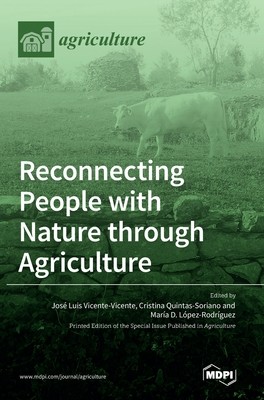
- We will send in 10–14 business days.
- Publisher: MDPI AG
- ISBN-10: 3036538550
- ISBN-13: 9783036538556
- Format: 17 x 24.4 x 2.1 cm, hardcover
- Language: English
- SAVE -10% with code: EXTRA
Reconnecting People with Nature through Agriculture (e-book) (used book) | bookbook.eu
Reviews
Description
An increasing number of people live in cities. In recent decades, this, combined with rural abandonment and landscape polarisation, has resulted in high land ownership concentrations and agricultural intensification. This, in turn, has resulted in a significant decrease in the resilience of agriculture and overall food systems and threatens the maintenance of traditional indigenous and peasant farming.
Therefore, there is an urgent need to reconnect society with the sustainable use of agroecosystems by fostering resilient social-ecological systems, emphasising the links between the functioning of natural systems and human well-being, and stressing the benefits that people derive from them.
This Special Issue aims to highlight impactful research and commentaries that focus on attempts to connect people with nature for the promotion of sustainable agricultural transitions. This Issue embraces inter- and trans-disciplinary studies from multiple disciplines (e.g., agricultural sciences, environmental sciences, geography, economy, and sociology), as well as those incorporating other knowledge systems (e.g., local and indigenous) in the co-construction of knowledge for sustainable agriculture, including studies in rural areas (e.g., GIAHS or HNV farmland) and initiatives that address urban-rural relationships or those developed within metropolitan areas (e.g., community-supported agriculture, food hubs, domestic gardens, multifunctional agriculture, and farmers´ or consumers´ cooperatives) and studies assessing the societal and ecological impacts of those initiatives.
EXTRA 10 % discount with code: EXTRA
The promotion ends in 10d.07:36:41
The discount code is valid when purchasing from 10 €. Discounts do not stack.
- Publisher: MDPI AG
- ISBN-10: 3036538550
- ISBN-13: 9783036538556
- Format: 17 x 24.4 x 2.1 cm, hardcover
- Language: English English
An increasing number of people live in cities. In recent decades, this, combined with rural abandonment and landscape polarisation, has resulted in high land ownership concentrations and agricultural intensification. This, in turn, has resulted in a significant decrease in the resilience of agriculture and overall food systems and threatens the maintenance of traditional indigenous and peasant farming.
Therefore, there is an urgent need to reconnect society with the sustainable use of agroecosystems by fostering resilient social-ecological systems, emphasising the links between the functioning of natural systems and human well-being, and stressing the benefits that people derive from them.
This Special Issue aims to highlight impactful research and commentaries that focus on attempts to connect people with nature for the promotion of sustainable agricultural transitions. This Issue embraces inter- and trans-disciplinary studies from multiple disciplines (e.g., agricultural sciences, environmental sciences, geography, economy, and sociology), as well as those incorporating other knowledge systems (e.g., local and indigenous) in the co-construction of knowledge for sustainable agriculture, including studies in rural areas (e.g., GIAHS or HNV farmland) and initiatives that address urban-rural relationships or those developed within metropolitan areas (e.g., community-supported agriculture, food hubs, domestic gardens, multifunctional agriculture, and farmers´ or consumers´ cooperatives) and studies assessing the societal and ecological impacts of those initiatives.


Reviews